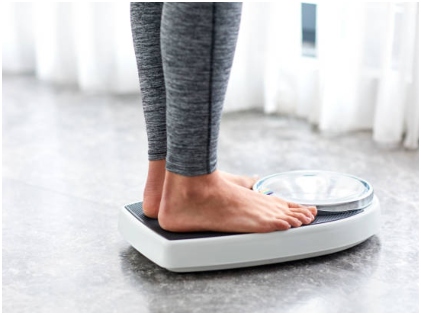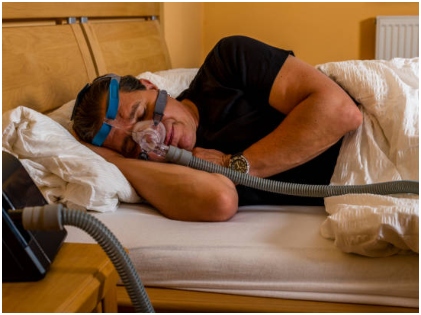Sleep apnea is a condition that may disrupt your sleep and stop you from breathing for a short time while you are still sleeping. People who suffer from sleep apnea have a tough time drawing in oxygen. This sudden reduction in oxygen supply can have a serious impact on your health. If it is left untreated, the condition can get worse. Here’s how you can treat sleep apnea at home.
Lose Some Weight
 The first thing that doctors suggest to people who suffer from sleep apnea is to lose weight. Obesity, especially in the upper body, can increase the risk of airway obstruction and block nasal passages. These obstructions may stop you from breathing for a few seconds or minutes. However, you can maintain a healthy weight to keep your airways clear and reduce sleep apnea symptoms. Just a little reduction of weight can stall your sleep apnea from getting worse and stop you from needing surgery or CPAP therapy.
The first thing that doctors suggest to people who suffer from sleep apnea is to lose weight. Obesity, especially in the upper body, can increase the risk of airway obstruction and block nasal passages. These obstructions may stop you from breathing for a few seconds or minutes. However, you can maintain a healthy weight to keep your airways clear and reduce sleep apnea symptoms. Just a little reduction of weight can stall your sleep apnea from getting worse and stop you from needing surgery or CPAP therapy.
Yoga Can Help
Regular exercise doesn’t only help increase energy level, but also strengthens your heart muscles. Yoga can also help improve your respiratory health and increase the oxygen flow.
Sleep apnea can also decrease the oxygen saturation in your blood. Yoga is one of the best holistic practices to improve your oxygen levels by incorporating some simple breathing exercises. Yoga can give you a break from these sleep disturbances.
Change Your Sleeping Position
 While you may be thinking of including big changes to make your condition better, what you need to do is make small and sustainable changes.
While you may be thinking of including big changes to make your condition better, what you need to do is make small and sustainable changes.
These changes may include changing your sleeping position to ensure you get a good night’s rest without any disruptions. By just changing your sleeping position, you can immediately breathe better and have greater control over your sleep apnea symptoms.
The supine position may not be the ideal sleeping position if you are suffering from sleep apnea. You can sleep on the side to enable normal, proper breathing. However, some studies show that it is a little different for children. They can fare better if they sleep on their backs. If you have any doubts, you can discuss the same with your doctor.
A Humidifier to Make Breathing Easy
Humidifiers are one of the best devices to lend some moisture to the air. When the air is dry, it can affect your body and the respiratory system. Just by using a humidifier, you can open your airways, decrease congestion, and enjoy a better breathing technique.
To get more benefits out of it, you can add essential oils such as lavender, peppermint, or eucalyptus oil. Each of the oils comes with a range of benefits, and collectively they are soothing and produce anti-inflammatory effects. Just ensure you follow proper instructions when using a humidifier. It is important to clean it up regularly to eliminate the formation of bacteria and molds.
Stop Smoking and Drinking Alcohol
Lifestyle changes are your best bet to improve your health for the better. It can also encourage better sleeping habits. The two most important lifestyle changes to add are to stop smoking and limit your alcohol intake, which can help you sleep better. Alcohol tends to relax the muscles in your throat and control the breathing process. This can even interrupt your sleep cycle, leading to inflammation in your airways. Tobacco is notorious for causing inflammation and giving rise to swelling in the airways. Needless to say, these two habits can lead to serious sleep disorders.
Some Additional Help
 Oral appliances are one of the best tools you can add to your arsenal to treat sleep apnea. All you have to do is reposition your jaw in a way that it stays open while you sleep.
Oral appliances are one of the best tools you can add to your arsenal to treat sleep apnea. All you have to do is reposition your jaw in a way that it stays open while you sleep.
The two devices that can come in useful are mandibular advancement equipment and tongue stabilizing equipment. It decreases the lower jaw and pushes your tongue forward to lower the obstruction that affects the back of your throat. However, this kind of equipment may need help from your dentist to fix it. Oral appliances are particularly useful for people who are unable to use a CPAP device.
Talk to your doctor to find a suitable remedy for sleep apnea. The right medical intervention can prevent the condition from getting worse. The best way to treat the condition is to first try lifestyle modifications. If it does not help much, make sure you get advice from an experienced doctor.





